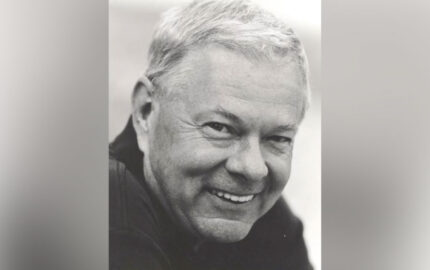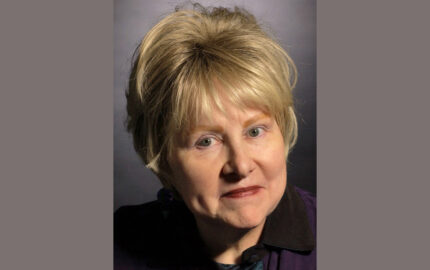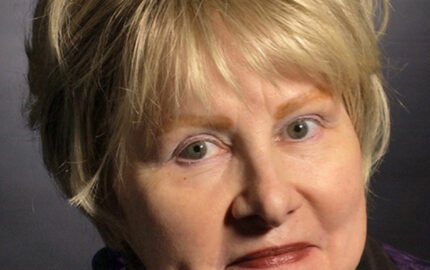Lewis Nkosi, the first black South African journalist to win a Nieman Fellowship, died September 5 in Johannesburg after a long illness. He was 73.
He was described as a “giant of South African letters.” As a young man in the 1950s, he was one of a new generation of young blacks writing first for the Golden Post newspaper and then for the legendary Drum magazine, giving voice to a segment of the population yearning to influence a movement toward change in South Africa. In Nkosi’s forceful writing for Drum, he characterized his country’s racial policies as “terribly sick” and its citizens as “terrorized” by security police.
Nkosi’s decision to accept a Nieman Fellowship in the class of 1961 rested on a wrenching choice. The South African government would not give him a visa unless he agreed to give up his country and surrender his citizenship to come to Harvard. He decided it was worth it to escape apartheid and to study with journalists from around the world. He said later that “the pull of Harvard and the Nieman Foundation was such that I felt I had nothing to lose by coming to the United States.”
After his Nieman year, Nkosi established his journalistic credentials in the U.S. and in England. He became an internationally known scholar on contemporary African literature. He was the author in 1986 of the novel Mating Birds, which was banned by the apartheid government and praised worldwide. Several critics compared it in style and narrative structure to Albert Camus’ The Stranger. His last novel, Mandela’s Ego, was on the short list for the Sunday Times Fiction Prize in 2007.
Nkosi’s plays included The Black Psychiatrist, We Can't All Be Martin Luther King, and The Rhythm of Violence. He held teaching posts at universities in Zambia, Warsaw, Wyoming, London and at Brandeis in Boston. Project director of the South African Literary Awards, Raks Seakhoa, said that Nkosi was "part of those talented few who took South Africa's literary heritage to greater heights."
During his memorial service in Johannesburg on September 8, he was remembered for his "laughter, naughtiness, and then, suddenly, depth.” His twin daughters, Louise and Joy, 39, recalled “wild jazz records as bedtime lullabies", trying to teach their father to swim, and how he tried to teach them to speak isiZulu.
Nkosi grew up an orphan. His mother died when he was 12. He arrived in Cambridge at age 23, an especially young age for a Nieman Fellow. Recalling that time during a discussion at the 70th Nieman Convocation in 2008, Nkosi said, “I needed a whole lot of mothers. I was very thin and the wives of the Niemans fed me and made an enormous effort to build me up.”
He told the story of a Nieman dinner on the day of the Bay of Pigs invasion in 1961. That evening, as dinner was ending, “there was an uproar in Harvard Square. There were smoke and lurid lights all over the place.” He and another fellow went to investigate and found students burning tires, rocking cars and shouting slogans. “My goodness” his colleague said to him, “at last these sleepy bourgeois students are waking up,” protesting the invasion. The two rushed to the scene and asked what was going on. “We found out soon enough that (Harvard) President Pusey had changed the inscription on the graduation certificates from Latin to English and the students were burning tires in protest.”
In addition to his twin daughters, Nkosi is survived by his wife, Astrid Starck.
He was described as a “giant of South African letters.” As a young man in the 1950s, he was one of a new generation of young blacks writing first for the Golden Post newspaper and then for the legendary Drum magazine, giving voice to a segment of the population yearning to influence a movement toward change in South Africa. In Nkosi’s forceful writing for Drum, he characterized his country’s racial policies as “terribly sick” and its citizens as “terrorized” by security police.
Nkosi’s decision to accept a Nieman Fellowship in the class of 1961 rested on a wrenching choice. The South African government would not give him a visa unless he agreed to give up his country and surrender his citizenship to come to Harvard. He decided it was worth it to escape apartheid and to study with journalists from around the world. He said later that “the pull of Harvard and the Nieman Foundation was such that I felt I had nothing to lose by coming to the United States.”
After his Nieman year, Nkosi established his journalistic credentials in the U.S. and in England. He became an internationally known scholar on contemporary African literature. He was the author in 1986 of the novel Mating Birds, which was banned by the apartheid government and praised worldwide. Several critics compared it in style and narrative structure to Albert Camus’ The Stranger. His last novel, Mandela’s Ego, was on the short list for the Sunday Times Fiction Prize in 2007.
Nkosi’s plays included The Black Psychiatrist, We Can't All Be Martin Luther King, and The Rhythm of Violence. He held teaching posts at universities in Zambia, Warsaw, Wyoming, London and at Brandeis in Boston. Project director of the South African Literary Awards, Raks Seakhoa, said that Nkosi was "part of those talented few who took South Africa's literary heritage to greater heights."
During his memorial service in Johannesburg on September 8, he was remembered for his "laughter, naughtiness, and then, suddenly, depth.” His twin daughters, Louise and Joy, 39, recalled “wild jazz records as bedtime lullabies", trying to teach their father to swim, and how he tried to teach them to speak isiZulu.
Nkosi grew up an orphan. His mother died when he was 12. He arrived in Cambridge at age 23, an especially young age for a Nieman Fellow. Recalling that time during a discussion at the 70th Nieman Convocation in 2008, Nkosi said, “I needed a whole lot of mothers. I was very thin and the wives of the Niemans fed me and made an enormous effort to build me up.”
He told the story of a Nieman dinner on the day of the Bay of Pigs invasion in 1961. That evening, as dinner was ending, “there was an uproar in Harvard Square. There were smoke and lurid lights all over the place.” He and another fellow went to investigate and found students burning tires, rocking cars and shouting slogans. “My goodness” his colleague said to him, “at last these sleepy bourgeois students are waking up,” protesting the invasion. The two rushed to the scene and asked what was going on. “We found out soon enough that (Harvard) President Pusey had changed the inscription on the graduation certificates from Latin to English and the students were burning tires in protest.”
In addition to his twin daughters, Nkosi is survived by his wife, Astrid Starck.


